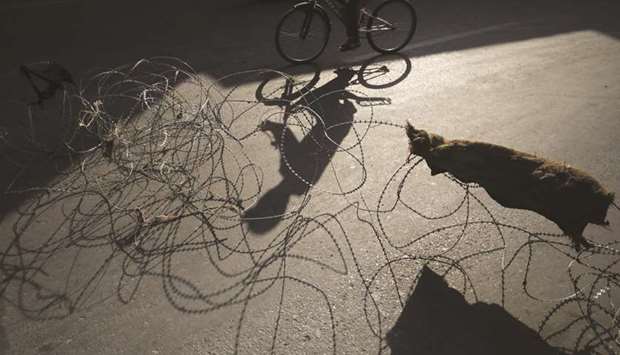Jammu and Kashmir has seen an average of nearly 20 protests per day against Indian rule over the last six weeks despite a security lockdown to quell unrest, a senior government source said.
Tensions remain high in the region after New Delhi’s controversial decision last month to revoke the territory’s decades old semi-autonomous status.
Despite a curfew, movement restrictions and the severe curtailment of Internet and mobile phone services, public demonstrations against India – mostly in Srinagar – have been constant, the source said late Saturday.
Altogether there have been 722 protests since August 5, with Baramulla district in the northwest and Pulwama in the south the biggest hotspots after Srinagar, the source said.
Since that date, nearly 200 civilians and 415 security force members have been hurt, according to the source.
Ninety-five of the civilians were injured in the last two weeks, the official said.
So far more than 4,100 people – including 170 political leaders – have been detained across the Kashmir Valley, with 3,000 released in the past two weeks, the official said.
It was unclear whether any politicians were among those released.
Authorities have so far insisted that outbreaks of violence have been minimal, and that only five civilians have died since the clampdown started.
The relatives of four of those killed said they believed the security forces were responsible for their deaths.
While schools, colleges and universities are functioning normally in the Jammu and Ladakh divisions, the same cannot be said for the valley where education has taken the worst beating because of the clampdown.
Authorities have opened schools up to the 10th standard in the valley, but the attendance of children has been disappointing so far.
“All the teaching staff have been attending the valley’s government-run schools, though the attendance of children has not improved,” said an official.
Meanwhile, former chief minister and senior Congress leader Ghulam Nabi Azad has filed a petition in the Supreme Court over the Kashmir issue.
The appeal will be heard by a bench headed by Chief Justice Ranjan Gogoi today along with various petitions including one of Communist Party of India-Marxist leader Sitaram Yechury who has challenged the detention of his party colleague Mohamed Yousuf Tarigami.
The court will also hear other petitions related to various issues after the scrapping of Article 370.
These petitions deal with various issues, including relaxation of movement in Jammu and Kashmir.
The Jammu & Kashmir People’s Conference, led by Sajjad Lone, has also moved the Supreme Court challenging the abrogation of Article 370.
Besides, Marumalarchi Dravida Munnetra Kazhagam party’s (MDMK) general secretary Vaiko has filed a habeas corpus petition in the Supreme Court to produce former chief minister of Jammu and Kashmir Farooq Abdullah.
Kashmir Times editor Anuradha Bhasin’s plea has sought relaxation on media movement in the valley and asked the government to file a response in a week.
The court will also hear another habeas corpus plea filed by law graduate Mohamed Aleem Syed, who has submitted a report about the situation in the valley when he went to Anantnag to meet his parents.

A man rides a bicycle past concertina wire during restrictions in Srinagar yesterday.
